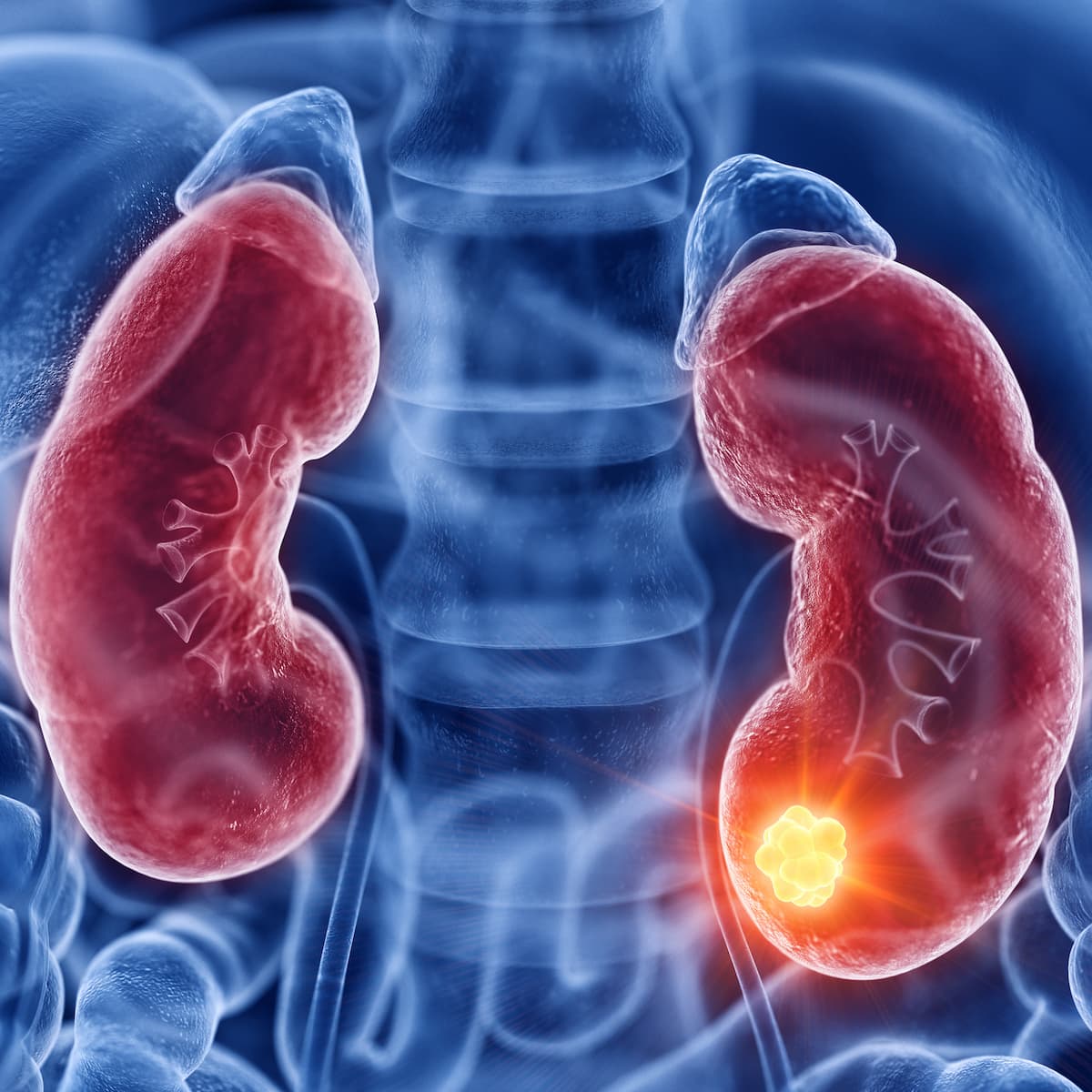Belzutifan/Lenvatinib Appears Clinically Active In Renal Cell Carcinoma
The combination is also associated with a manageable toxicity profile in the second and subsequent treatment lines for patients with advanced renal cell carcinoma.
“Preliminary results…from arm B5 of KEYMAKER-U03B showed promising antitumor activity with belzutifan plus lenvatinib in patients with ccRCC that progressed on PD-1/L1 inhibitors and VEGF-TKIs, a population that has limited efficacious treatment options,” said an expert from the Institut Gustave Roussy in France.

According to initial results from arm B5 of the phase 1/2 KEYMAKER-U03B study (NCT04626518), the combination of belzutifan (Welireg) and lenvatinib (Lenvima) produced promising clinical activity and a manageable toxicity profile in patients with advanced clear cell renal cell carcinoma (ccRCC) who experienced disease progression after receiving a PD-1/L1 inhibitor and a VEGF-TKI.1
Results presented at the 2023 American Society of Clinical Oncology (ASCO) Annual Meeting showed that at a median follow-up of 6.9 months, a regimen combining the HIF-2α inhibitor belzutifan and the VEGF-TKI lenvatinib elicited an objective response rate (ORR) of 50% (95% CI, 29-71) among 24 patients who had received at least 2 postbaseline scans. All of the responses were partial responses.
The clinical benefit rate (ORR + stable disease ≥6 months) was 54% and the median duration of response was not reached (range, 1.4+ to 14.0+ months). Nearly three-fourths (74%) of responders remained in response for 12 months or longer. One patient had progressive disease.
Among all enrolled patients, the median progression-free survival (PFS) was 11.2 months (95% CI, 4.2 to not reached) and the 6-months PFS rate was 55%.
“Preliminary results…from arm B5 of KEYMAKER-U03B showed promising antitumor activity with belzutifan plus lenvatinib in patients with ccRCC that progressed on PD-1/L1 inhibitors and VEGF-TKIs, a population that has limited efficacious treatment options,” said first study author Laurence Albiges, MD, PhD, Institut Gustave Roussy, Villejuif, France.
Overall, the multicenter, multi-arm, open-label, adaptive, phase 1/2 KEYMAKER-U03B umbrella study is exploring various treatment combinations in patients with heavily pretreated ccRCC who have progressed after receiving a PD-1/L1 inhibitor and a VEGF-TKI, either in combination or sequentially.2 As of the cutoff date of September 29, 2022, 32 patients had been enrolled in arm B5, 30 had been treated, and 23 remained on treatment.
The median patient age was 60.5 years, 78% of patients were male, and 78% of patients had intermediate/poor IMDC risk disease. The ECOG performance status was 0 for 17 patients and 1 for 15 patients. Seventy-eight percent of patients had prior nephrectomy.
Patients in arm B5 were treated with belzutifan at 120 mg orally each day and lenvatinib at 20 mg orally each day. Patients received a median of 3.5 treatment cycles (range, 1.0-13.0)
There were no new safety signals compared with the safety profiles of belzutifan and lenvatinib reported in previous research.In the safety lead-in phase of the trial, only 1 of 10 evaluable patients had a dose-limiting toxicity, which was dyspnea (grade 1).
In the overall safety analysis, which included all 30 treated patients, 93% (n = 28) of patients experienced at least 1 treatment-related adverse event (TRAE). The TRAEs that occurred in at least 30% of patients were anemia (43%), fatigue (43%), hypertension (43%), proteinuria (33%), diarrhea (33%), nausea (33%), and decreased appetite (30%).
Grade 3/4 TRAEs occurred in half (n = 15) of the patients. The most common grade 3/4 TRAEs were hypertension (27%) and anemia (17%). TRAEs led to 1 patient discontinuing both study drugs, 2 patients discontinuing lenvatinib, and 2 patients discontinuing belzutifan. There were no deaths due to TRAEs.
The combination is being further examined in the phase 3 LITESPARK-011 study (NCT04586231), which is evaluating belzutifan/lenvatinib vs cabozantinib (Cabometyx) in patients with advanced RCC and disease progression after treatment with a PD-1/L1 inhibitor.
References
- Albiges L, Beckermann K, Miller WH, et al. Belzutifan plus lenvatinib for patients (pts) with advanced clear cell renal cell carcinoma (ccRCC) after progression on a PD-1/L1 and VEGF inhibitor: Preliminary results of arm B5 of the phase 1/2 KEYMAKER-U03B study. J Clin Oncol. 2023;41(suppl 16):4553. doi:10.1200/JCO.2023.41.16_suppl.4553
- NIH ClinicalTrials.gov. Substudy 03B: A Study of Immune and Targeted Combination Therapies in Participants With Second Line Plus (2L+) Renal Cell Carcinoma (MK-3475-03B). Last updated May 18, 2023. Accessed June 2, 2023. https://clinicaltrials.gov/ct2/show/NCT04626518
Frontline Chemo-Free Regimen Supported in HR+/HER2+ Breast Cancer Therapy
January 1st 2024Combining anastrozole with palbociclib, trastuzumab, and pertuzumab as a frontline therapy for hormone receptor–positive, HER2-positive breast cancer may avoid some of the toxicities associated with chemotherapy, says Amy Tiersten, MD.
Oncology On-The-Go Podcast: ASCO 2023 Recap
June 19th 2023Experts from University of California, Los Angeles Health and Mayo Clinic discuss key data presented at the 2023 American Society of Clinical Oncology (ASCO) Annual Meeting in the gynecologic and gastrointestinal cancer spaces and how they may impact patient care.